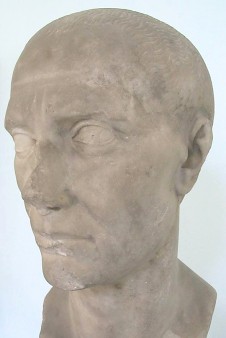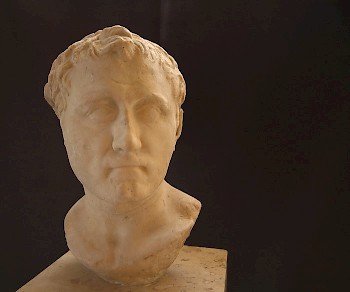Julia (2)
Julia (c.80-54): daughter of Julius Caesar, married to Pompey the Great.
Julia, born between 83 and 76, was the daughter of Gaius Julius Caesar, a young Roman nobleman, and Cornelia. The parents belonged to two families that were known for their "popular" sympathies: to obtain legitimacy for measures, they preferred the People's Assembly to the Senate, and to obtain support from the masses, they backed social reforms. Unfortunately, the populares were almost without influence after the coup d'état of Sulla (82); for twelve years, their opponents, the optimates, were able to dictate the political agenda.

In 70, however, two adherents of Sulla, Pompey the Great and Crassus, felt that the Sullan system did not offer them enough possibilities, and they revoked some of Sulla's measures. Almost immediately, Julius Caesar claimed the legacy of the former leader of the populares, a man named Gaius Marius, in a famous speech at the funeral of his aunt (also called Julia), who had been married to Marius. For the next years, Caesar's star continued to rise, and Roman political life became increasingly dominated by Pompey, Crassus, and Caesar. In 59, they concluded an alliance, which is known as the First Triumvirate.
To cement the alliance, Caesar married Calpurnia, whose father Piso was a close friend of Crassus, and gave the hand of his daughter Julia to Pompey, even though she had already been promised to a man named Quintus Servilius Caepio. The marriage appears to have been a happy one. In his Life of Pompey, the Greek author Plutarch of Chaeronea writes that
the young wife's fondness for her husband was notorious, and Pompey, at his age, scarcely seemed to be a fit object for such passionate devotion (more...).
In Antiquity, the risks of pregnancy were bigger than today. In the summer of 55, while her father was attempting to cross from Gaul to Britain, Julia had a miscarriage. This sad incident repeated itself a year later, in the first days of September 54, and this time, Julia died of the consequences. Pompey wanted to bury her near his country house, but the Roman people allowed her the honor of a burial on the Field of Mars.

As her father, Caesar must have mourned his daughter, and as a politician, he must have understood that the friendship with Pompey was no longer certain. Several ancient authors (Velleius Paterculus, Lucan, Florus) have written that her death, and the death of Crassus in the battle of Carrhae (53), removed two important obstacles for the civil war that was bound to break out between Caesar and Pompey. There is little reason to doubt this. In the summer of 48, Caesar defeated his former son-in-law in the battle of Pharsalus.